2021届中考复习 人教 一轮教材复习第7讲人教七年级下册Units 10~12 课件45张
文档属性
| 名称 | 2021届中考复习 人教 一轮教材复习第7讲人教七年级下册Units 10~12 课件45张 | 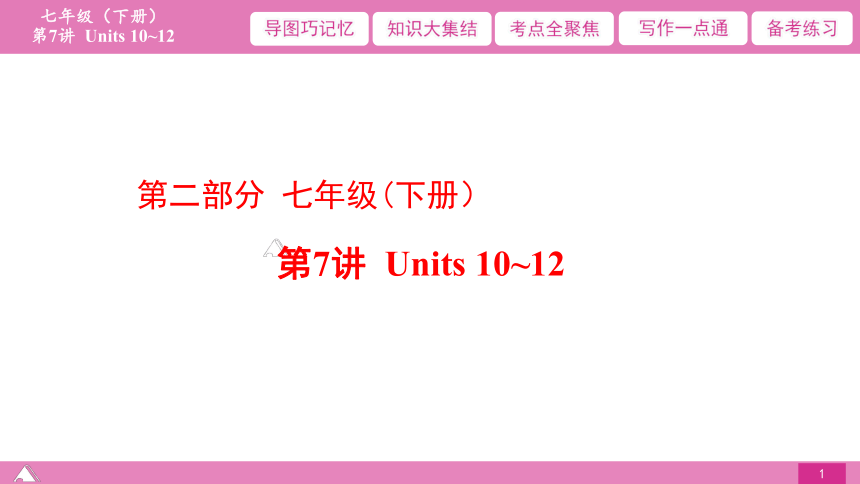 | |
| 格式 | pptx | ||
| 文件大小 | 917.6KB | ||
| 资源类型 | 教案 | ||
| 版本资源 | 人教新目标(Go for it)版 | ||
| 科目 | 英语 | ||
| 更新时间 | 2021-02-21 10:49:40 | ||
图片预览

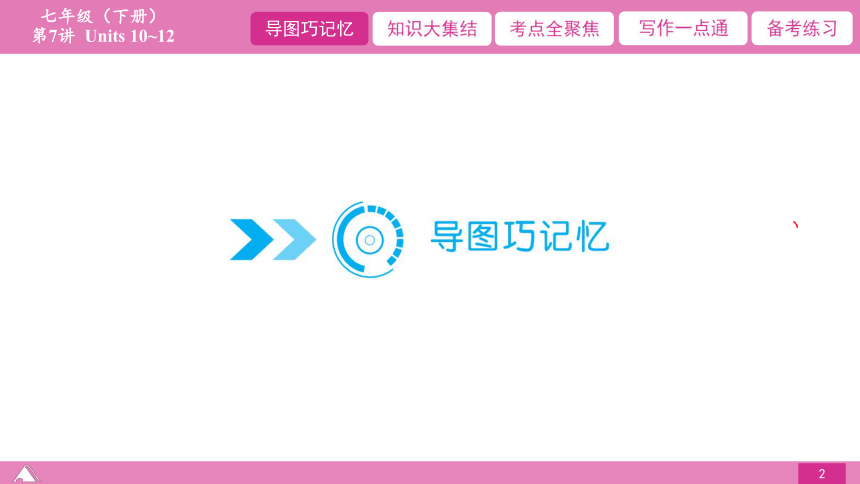
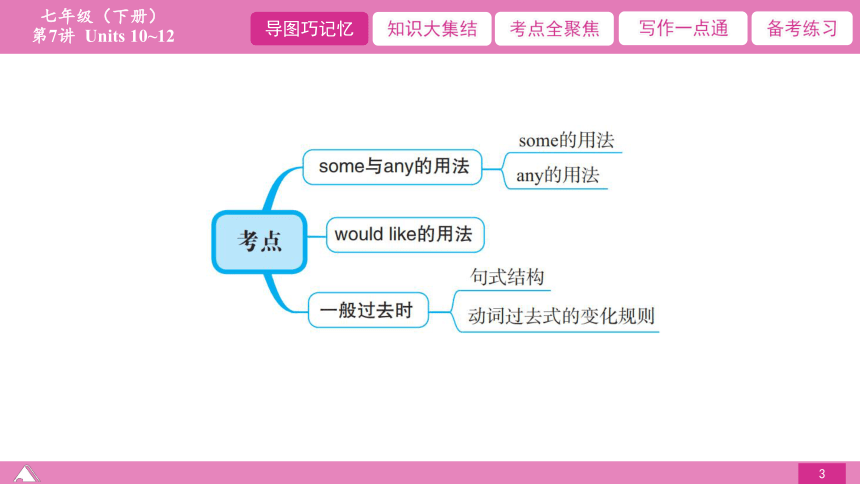

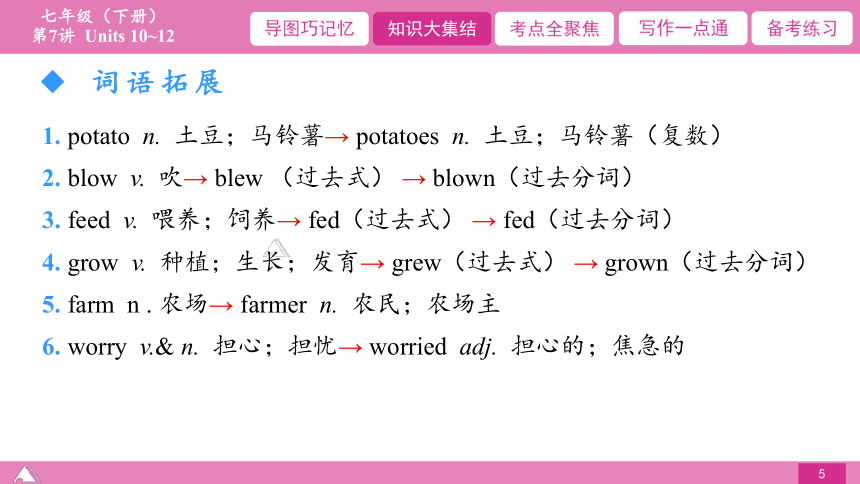
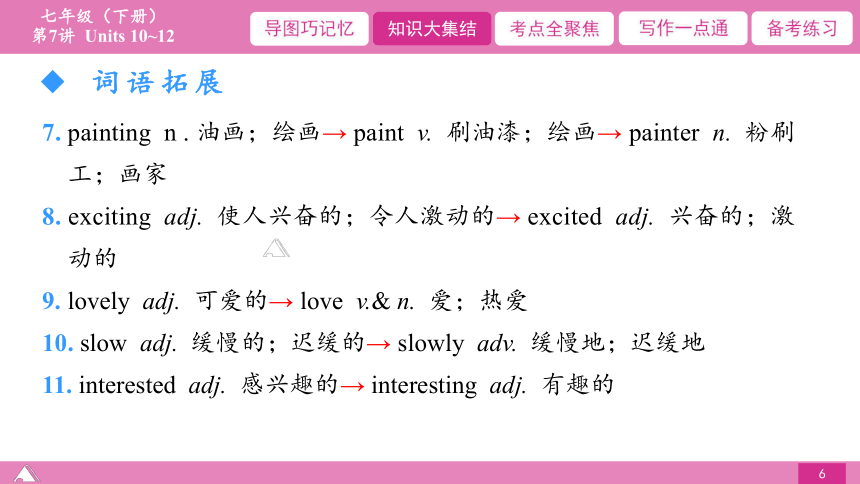
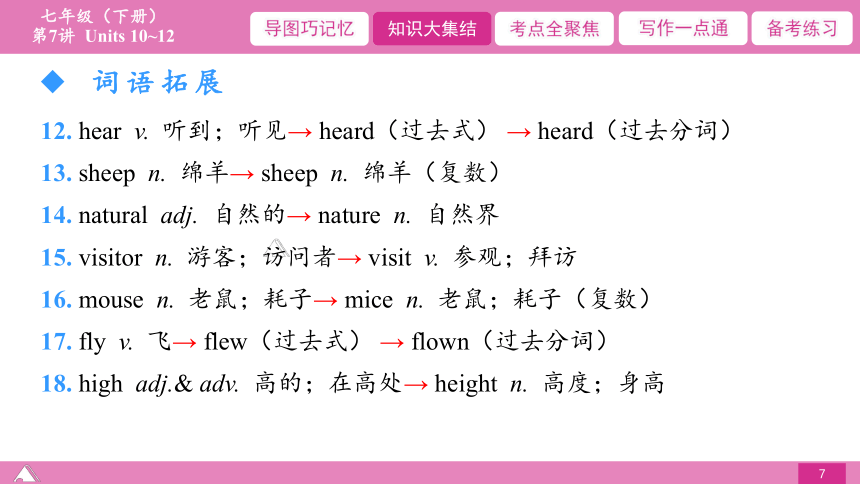
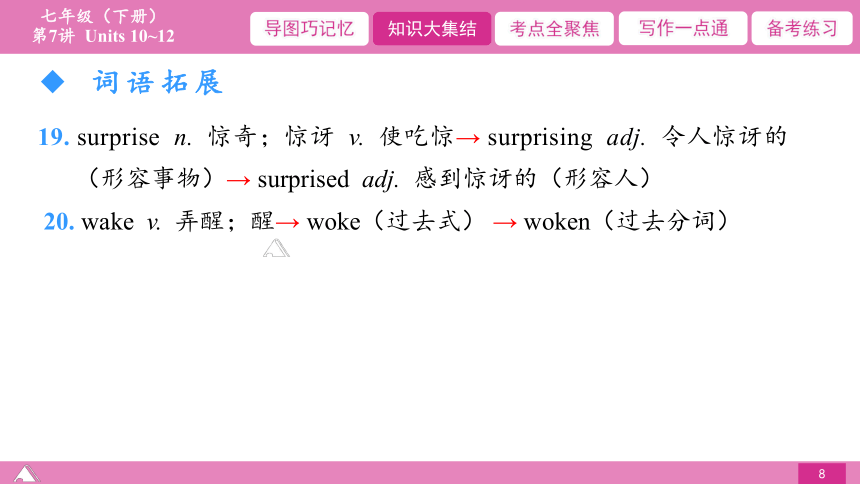
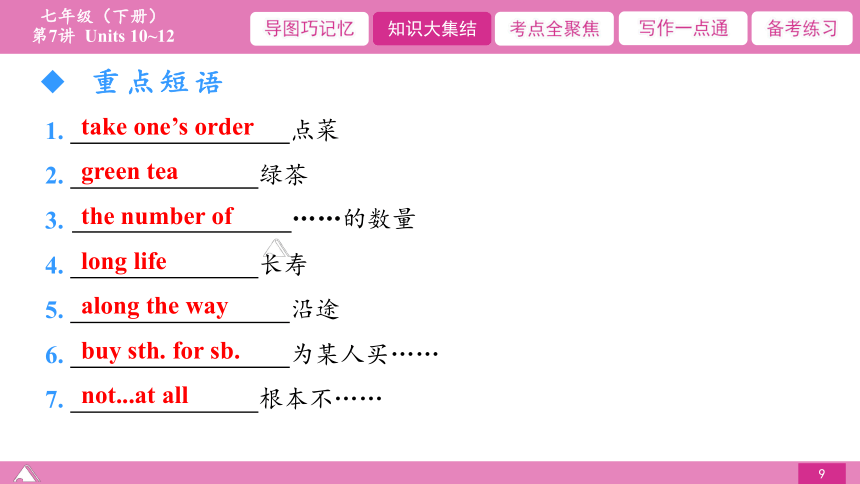
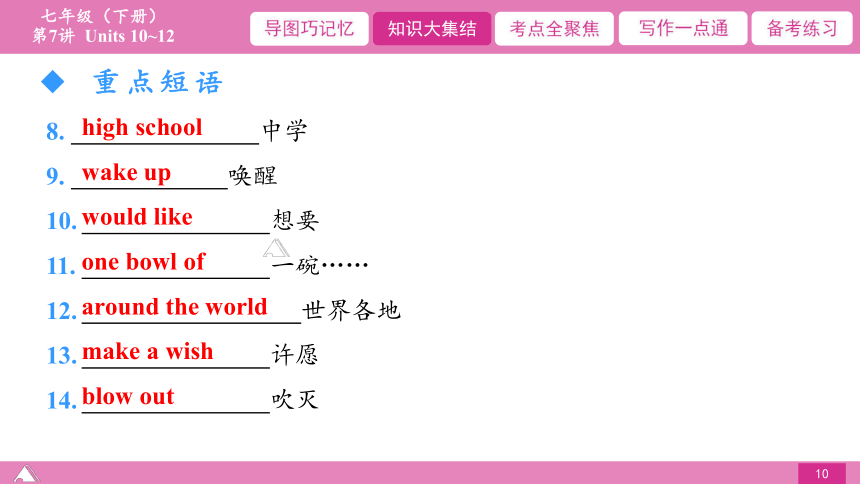
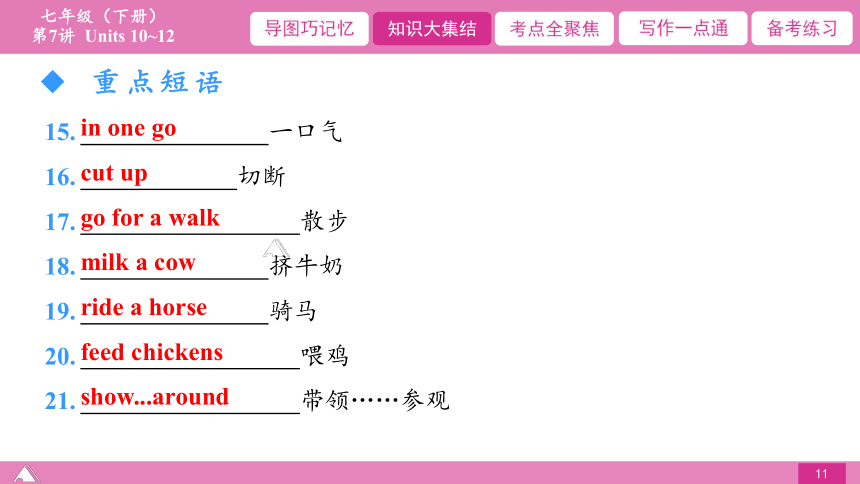
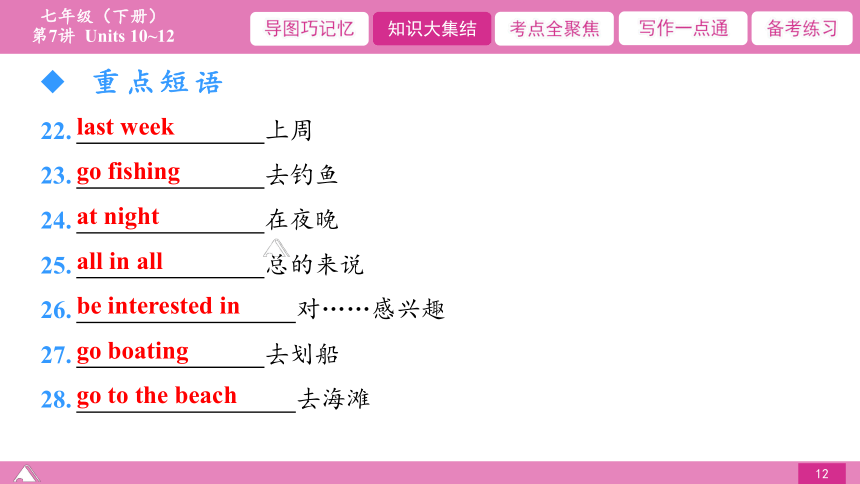
文档简介
第7讲 Units 10~12
第二部分 七年级(下册)
1. potato n. 土豆;马铃薯→ potatoes n. 土豆;马铃薯(复数)
2. blow v. 吹→ blew (过去式) → blown(过去分词)
3. feed v. 喂养;饲养→ fed(过去式) → fed(过去分词)
4. grow v. 种植;生长;发育→ grew(过去式) → grown(过去分词)
5. farm n . 农场→ farmer n. 农民;农场主
6. worry v.& n. 担心;担忧→ worried adj. 担心的;焦急的
7. painting n . 油画;绘画→ paint v. 刷油漆;绘画→ painter n. 粉刷工;画家
8. exciting adj. 使人兴奋的;令人激动的→ excited adj. 兴奋的;激动的
9. lovely adj. 可爱的→ love v.& n. 爱;热爱
10. slow adj. 缓慢的;迟缓的→ slowly adv. 缓慢地;迟缓地
11. interested adj. 感兴趣的→ interesting adj. 有趣的
12. hear v. 听到;听见→ heard(过去式) → heard(过去分词)
13. sheep n. 绵羊→ sheep n. 绵羊(复数)
14. natural adj. 自然的→ nature n. 自然界
15. visitor n. 游客;访问者→ visit v. 参观;拜访
16. mouse n. 老鼠;耗子→ mice n. 老鼠;耗子(复数)
17. fly v. 飞→ flew(过去式) → flown(过去分词)
18. high adj.& adv. 高的;在高处→ height n. 高度;身高
19. surprise n. 惊奇;惊讶 v. 使吃惊→ surprising adj. 令人惊讶的(形容事物)→ surprised adj. 感到惊讶的(形容人)
20. wake v. 弄醒;醒→ woke(过去式) → woken(过去分词)
1.
点菜
take one’s order
2.
绿茶
green tea
3.
……的数量
the number of
4.
长寿
long life
5.
沿途
along the way
6.
为某人买……
buy sth. for sb.
7.
根本不……
not...at all
8.
中学
high school
9.
唤醒
wake up
10.
想要
would like
11.
一碗……
one bowl of
12.
世界各地
around the world
13.
许愿
make a wish
14.
吹灭
blow out
15.
一口气
in one go
16.
切断
cut up
17.
散步
go for a walk
18.
挤牛奶
milk a cow
19.
骑马
ride a horse
20.
喂鸡
feed chickens
21.
带领……参观
show...around
22.
上周
last week
23.
去钓鱼
go fishing
24.
在夜晚
at night
25.
总的来说
all in all
26.
对……感兴趣
be interested in
27.
去划船
go boating
28.
去海滩
go to the beach
29.
熬夜
stay up late
30.
逃跑
run away
31.
放风筝
fly a kite
32.
生火
make a fire
33.
互相;彼此
each other
34.
向……外看
look out of
35.
对……喊
shout to
36.
上上下下
up and down
1. —What would you like?
—I’m not sure yet. (P55)
——你想要什么?
——还没确定。
2. —What kind of noodles would you like?
—I’d like beef noodles, please. (P56)
——你想要哪种面条?
——我想要牛肉面。
3. —What size would you like?
—Large, please.(P56)
——你要多大碗的?
——请来大碗的。
4. They are a symbol of life and good luck.(P59)
它们是生命和好运的象征。
5. —How was your school trip?
—It was great! (P63)
——你的学校郊游怎么样?
——好极了!
6. —Did you go to the zoo?
—No, I didn’t. I went to a farm. (P63)
——你去动物园了吗?
——不,没有。我去农场了。
7. —Did you see any cows?
—Yes, I did. I saw quite a lot. (P63)
——你看到一些奶牛了吗?
——是的,我看到了。我看到了相当多的奶牛。
8. —Were the strawberries good?
—Yes, they were. / No, they weren’t. (P63)
——这些草莓好吃吗?
——好吃。/ 不,不好吃。
9. —What did you do last weekend, Lucy?
—Well, on Saturday morning, I played badminton. (P67)
——露西,上周末你做什么了?
——噢,周六上午,我打羽毛球了。
10. I worked as a guide at the Natural History Museum.(P68)
我在自然历史博物馆当导游。
11. They have a butterfly house with over 200 kinds of butterflies!(P68)
他们有一个有200多种蝴蝶的蝴蝶馆!
12. There we put up our tents and made a fire to keep us warm and cook food on. (P71)
在那里我们搭起帐篷,生火取暖并做饭。
13. But I was so tired that I went to sleep early.(P71)
但是我太累了,所以早早就睡了。
14. When we looked out of our tents, we saw a big snake sleeping near the fire. (P71)
当我们向帐篷外望去时,我们看见一条大蛇正在篝火附近睡觉。
15. We shouted to our parents to let them know about the danger. (P71)
我们大声叫喊我们的父母,想让他们知道危险所在。
考点1 some 与 any 的用法
考点2 would like 的用法
考点3 一般过去时
考点1 some 与 any 的用法。
1. some 意为“一些,某些,某个”,可代替名词和形容词,常用于肯定句中。在句子中用作主语、宾语、定语。作定语时,它可以修饰单数可数名词和复数可数名词,也可以修饰不可数名词。
(1)用于肯定句中。例如:
You can ask some boys to help you. 你可以叫些男孩来帮助你。
Please bring some water. 请拿些水来。
(2)some 用于疑问句时表示请求、邀请或希望得到肯定的回答。例如:
Would you like some coffee? 来点咖啡怎么样?
2. any 意为“一些,任何”,可代替名词和形容词,常用于疑问句或否定句中,也可以用于条件状语从句中。作定语时,它可以修饰复数形式的可数名词和不可数名词。
(1)用于疑问句或否定句中。例如:
Are there any horses on the farm? 农场里有马吗?
There won’t be any trouble. 不会有任何麻烦。
(2)用于条件状语从句中。例如:
If you have any questions, you can ask me. 如果你有什么问题,可以问我。
考点2 would like 的用法。
would like 意为“想要”,语气非常委婉。具体用法如下:
1. 后接名词或代词,表示具体“要”某样东西。例如:
I would like a cup of tea. 我要一杯茶。
2. 后接动词不定式(就是 to do 形式),表示意愿、喜爱,常用于有礼貌地提出邀请、请求或建议。例如:
I would like to help you. 我愿意帮你。
3. would like sb. to do sth. 意为“想要某人做某事”。例如:
I’d like you to meet them. 我想要你见见他们。
4. “Would you like...?”意为“你(们)想要……吗?”,表示向对方提出客气的、有礼貌的请求、邀请、希望或询问等。例如:
Would you like an orange? 你想要个橘子吗?
注意:它的肯定回答多用“Yes, please./Yes, I’d (we’d) like (love) to./Certainly./Yes, thank you.”等;否定回答常用“No, thanks./No, thank you.”等。例如:
—Would you like something to drink? 你想要点喝的吗?
—Yes, thank you. / No, thanks. 是的,谢谢。/不要了,谢谢。
考点3 一般过去时。
一般过去时表示过去某个特定时间发生的动作或存在的状态,通常与 yesterday, last year, in 1976, a few months ago 等表示过去的时间状语连用;也可以表示过去某一段时间内经常或反复发生的动作,通常与 often, usually, seldom 等表示频率的副词连用。
1. 一般过去时的句式结构。
肯定句:主语+动词过去式+其他. 例如:
I went to the zoo last Sunday. 上周日我去了动物园。
否定句:主语+was / were + not... 或者:主语+didn’t+动词原形+其他. 例如:
He wasn’t in the office just now. 他刚才不在办公室。
We didn’t go to the cinema last night. 昨晚我们没有去电影院。
一般疑问句: Did+主语+动词原形+其他?或者: Was / Were+主语+...?例如:
Did you have a good time last weekend? 上周末你们玩得开心吗?
Were you at school yesterday? 昨天你在学校吗?
特殊疑问句:
(1)疑问词在句中不作主语时:疑问词+did+主语+动词原形+其他?或者:疑问词+was / were+主语+其他?例如:
Where did you go last night? 昨晚你去哪儿了?
How was your weekend? 你的周末过得怎样?
(2)疑问词在句中作主语时:疑问词+动词过去式+其他?或者:疑问词+was / were+表语+其他?例如:
Who cleaned the classroom? 谁打扫了教室?
Who was here just now? 刚才谁在这里?
2. 动词过去式的变化规则。
{F5AB1C69-6EDB-4FF4-983F-18BD219EF322}规 则
例 词
一般在词尾加-ed
work—worked help—helped
以 e 结尾的加-d
live—lived hope—hoped
“辅音字母+y”结尾的动词,先变y为 i 再加-ed
study—studied carry—carried
末尾只有一个辅音字母的重读闭音节, 先双写这个辅音字母,再加-ed
stop—stopped plan—planned
3. 还有相当一部分动词的过去式是不规则变化的,需要加强记忆。例如:
do—did go—went
see—saw come—came
have—had say—said
buy—bought begin—began
活动经历
这类话题的作文属于记叙文。在写作时,要注意以下几点:
1. 通常用一般过去时来描述;
2. 一般要交代清楚时间、地点、人物、所做的事以及感受等;
3. 要注意按时间顺序来叙述所做的事情;
4. 叙述事情时,注意详略得当,文章末尾要点出主题。
常用句型
1. It was a...day.
2. I went to...
3. I saw / bought /...
4. I had a good time this day.
参考范文
My Trip to Qingdao
I had a two-day trip to Qingdao with my friends last summer vacation. We had a wonderful time there.
We went to Qingdao by bus. When we got there in the afternoon, we couldn’t wait to go to the beach. The weather was nice. Everything was beautiful. We walked along the beach and enjoyed the soft sand, the gentle wind and the blue sea. We took many photos. In the evening, we had a big seafood dinner. It was really delicious. The next morning, we went to Laoshan Mountain. It is not very high, but there is an old and interesting tale about it. So lots of visitors go there every year.
I enjoyed this trip very much and I hope I can go to Qingdao again.
一、单项选择。
1. —How was your weekend?
— .
A. I was too tired. B. It was like a bird.
C. I was not good. D. It was excellent.
2. —Today is Mum’s birthday. Let’s make a cake for her.
—That’s a good .
A. job B. idea
C. day D. boy
?
?
3. Don’t shout your parents. It’s impolite.
A. in B. for
C. on D. at
4. The car was so that he couldn’t afford it.
A. expensive B. nice
C. popular D. cheap
?
?
5. Wow! Your hair is growing so . You need a haircut(理发) again.
A. hard B. slowly
C. fast D. well
6. On July 15th, 2018, many Chinese people to see the football match between France and Croatia (克罗地亚).
A. picked up B. stayed up
C. set up D. took up
?
?
7. you work hard, you will make great progress.
A. If B. Before
C. Though D. Unless
8. He is always helping people without expecting in return.
A. nothing B. something
C. anything D. everything
?
?
9. The little boy is in all kinds of things and he is always asking questions.
A. excited B. exciting
C. interested D. interesting
10. Five years ago, Carol and her family to the US from Australia.
A. moved B. move
C. will move D. are moving
?
?
二、根据中文或首字母提示,完成单词。
1. Double Ninth Festival is a (特别的) day for our parents.
2. Can you (回答) these maths questions?
3. I went to Danny’s birthday party (昨天).
4. You really don’t have to (担心) about your weight. You look just right.
5. Winning isn’t (一切), but wanting to win is.
6. Mr. Smith often oversleeps, so his wife has to w him up in the morning.
special
answer
yesterday
worry
everything
ake
7. Wang Wei lives near the sea with his family, so they eat seafood q often.
8. Your ears can help you listen to your favorite songs and h the sound of birds.
9. India invents many kinds of curries(咖喱) to give its food d . tastes.
10. To his s , his father agreed with him to watch the volleyball match together.
uite
ear
ifferent
urprise
三、根据句意,用括号内所给单词的正确形式填空。
1. She is a pretty and (love) girl. We all like her.
2. Johnny couldn’t get to sleep, so he tried counting (sheep).
3. Today I would like (wear) my red gloves to play in the snow.
4. Last weekend, a group of students (pick) up all the garbage (垃圾) and cleaned every corner of the square.
5. The poor dog lost all four legs because of injury. (luck), people gave him artificial(人工的) legs.
lovely
sheep
to wear
picked
Luckily
四、综合填空。
I went on a trip to Europe last winter holiday. I 1. 10 days visiting and playing there. I visited many 2. . They are all very beautiful. But my favorite places were France and Switzerland.
Paris is a great city in France. As 3. says, the Eiffel Tower is a famous landmark(地标) for both France as a country and Paris as a city. The Louvre is also a 4. place to visit. It is a wonderful museum with lots of important art pieces. The Mona Lisa, one of the world’s most famous 5. , is just in the Louvre. Unluckily, 6. of the Louvre aren’t allowed to get very close to it.
spent
cities
everyone
popular
paintings
visitors
paint but everyone visit spend top white city popular be
When I 7. in Switzerland I visited a famous mountain. My family and I climbed to the 8. of the beautiful mountain. The snow on the mountain was very soft and 9. . I liked the feeling of being up high among beautiful scenery.
My trip to Europe was only 10 days long, 10. I will always remember it.
paint but everyone visit spend top white city popular be
was
top
white
but
第二部分 七年级(下册)
1. potato n. 土豆;马铃薯→ potatoes n. 土豆;马铃薯(复数)
2. blow v. 吹→ blew (过去式) → blown(过去分词)
3. feed v. 喂养;饲养→ fed(过去式) → fed(过去分词)
4. grow v. 种植;生长;发育→ grew(过去式) → grown(过去分词)
5. farm n . 农场→ farmer n. 农民;农场主
6. worry v.& n. 担心;担忧→ worried adj. 担心的;焦急的
7. painting n . 油画;绘画→ paint v. 刷油漆;绘画→ painter n. 粉刷工;画家
8. exciting adj. 使人兴奋的;令人激动的→ excited adj. 兴奋的;激动的
9. lovely adj. 可爱的→ love v.& n. 爱;热爱
10. slow adj. 缓慢的;迟缓的→ slowly adv. 缓慢地;迟缓地
11. interested adj. 感兴趣的→ interesting adj. 有趣的
12. hear v. 听到;听见→ heard(过去式) → heard(过去分词)
13. sheep n. 绵羊→ sheep n. 绵羊(复数)
14. natural adj. 自然的→ nature n. 自然界
15. visitor n. 游客;访问者→ visit v. 参观;拜访
16. mouse n. 老鼠;耗子→ mice n. 老鼠;耗子(复数)
17. fly v. 飞→ flew(过去式) → flown(过去分词)
18. high adj.& adv. 高的;在高处→ height n. 高度;身高
19. surprise n. 惊奇;惊讶 v. 使吃惊→ surprising adj. 令人惊讶的(形容事物)→ surprised adj. 感到惊讶的(形容人)
20. wake v. 弄醒;醒→ woke(过去式) → woken(过去分词)
1.
点菜
take one’s order
2.
绿茶
green tea
3.
……的数量
the number of
4.
长寿
long life
5.
沿途
along the way
6.
为某人买……
buy sth. for sb.
7.
根本不……
not...at all
8.
中学
high school
9.
唤醒
wake up
10.
想要
would like
11.
一碗……
one bowl of
12.
世界各地
around the world
13.
许愿
make a wish
14.
吹灭
blow out
15.
一口气
in one go
16.
切断
cut up
17.
散步
go for a walk
18.
挤牛奶
milk a cow
19.
骑马
ride a horse
20.
喂鸡
feed chickens
21.
带领……参观
show...around
22.
上周
last week
23.
去钓鱼
go fishing
24.
在夜晚
at night
25.
总的来说
all in all
26.
对……感兴趣
be interested in
27.
去划船
go boating
28.
去海滩
go to the beach
29.
熬夜
stay up late
30.
逃跑
run away
31.
放风筝
fly a kite
32.
生火
make a fire
33.
互相;彼此
each other
34.
向……外看
look out of
35.
对……喊
shout to
36.
上上下下
up and down
1. —What would you like?
—I’m not sure yet. (P55)
——你想要什么?
——还没确定。
2. —What kind of noodles would you like?
—I’d like beef noodles, please. (P56)
——你想要哪种面条?
——我想要牛肉面。
3. —What size would you like?
—Large, please.(P56)
——你要多大碗的?
——请来大碗的。
4. They are a symbol of life and good luck.(P59)
它们是生命和好运的象征。
5. —How was your school trip?
—It was great! (P63)
——你的学校郊游怎么样?
——好极了!
6. —Did you go to the zoo?
—No, I didn’t. I went to a farm. (P63)
——你去动物园了吗?
——不,没有。我去农场了。
7. —Did you see any cows?
—Yes, I did. I saw quite a lot. (P63)
——你看到一些奶牛了吗?
——是的,我看到了。我看到了相当多的奶牛。
8. —Were the strawberries good?
—Yes, they were. / No, they weren’t. (P63)
——这些草莓好吃吗?
——好吃。/ 不,不好吃。
9. —What did you do last weekend, Lucy?
—Well, on Saturday morning, I played badminton. (P67)
——露西,上周末你做什么了?
——噢,周六上午,我打羽毛球了。
10. I worked as a guide at the Natural History Museum.(P68)
我在自然历史博物馆当导游。
11. They have a butterfly house with over 200 kinds of butterflies!(P68)
他们有一个有200多种蝴蝶的蝴蝶馆!
12. There we put up our tents and made a fire to keep us warm and cook food on. (P71)
在那里我们搭起帐篷,生火取暖并做饭。
13. But I was so tired that I went to sleep early.(P71)
但是我太累了,所以早早就睡了。
14. When we looked out of our tents, we saw a big snake sleeping near the fire. (P71)
当我们向帐篷外望去时,我们看见一条大蛇正在篝火附近睡觉。
15. We shouted to our parents to let them know about the danger. (P71)
我们大声叫喊我们的父母,想让他们知道危险所在。
考点1 some 与 any 的用法
考点2 would like 的用法
考点3 一般过去时
考点1 some 与 any 的用法。
1. some 意为“一些,某些,某个”,可代替名词和形容词,常用于肯定句中。在句子中用作主语、宾语、定语。作定语时,它可以修饰单数可数名词和复数可数名词,也可以修饰不可数名词。
(1)用于肯定句中。例如:
You can ask some boys to help you. 你可以叫些男孩来帮助你。
Please bring some water. 请拿些水来。
(2)some 用于疑问句时表示请求、邀请或希望得到肯定的回答。例如:
Would you like some coffee? 来点咖啡怎么样?
2. any 意为“一些,任何”,可代替名词和形容词,常用于疑问句或否定句中,也可以用于条件状语从句中。作定语时,它可以修饰复数形式的可数名词和不可数名词。
(1)用于疑问句或否定句中。例如:
Are there any horses on the farm? 农场里有马吗?
There won’t be any trouble. 不会有任何麻烦。
(2)用于条件状语从句中。例如:
If you have any questions, you can ask me. 如果你有什么问题,可以问我。
考点2 would like 的用法。
would like 意为“想要”,语气非常委婉。具体用法如下:
1. 后接名词或代词,表示具体“要”某样东西。例如:
I would like a cup of tea. 我要一杯茶。
2. 后接动词不定式(就是 to do 形式),表示意愿、喜爱,常用于有礼貌地提出邀请、请求或建议。例如:
I would like to help you. 我愿意帮你。
3. would like sb. to do sth. 意为“想要某人做某事”。例如:
I’d like you to meet them. 我想要你见见他们。
4. “Would you like...?”意为“你(们)想要……吗?”,表示向对方提出客气的、有礼貌的请求、邀请、希望或询问等。例如:
Would you like an orange? 你想要个橘子吗?
注意:它的肯定回答多用“Yes, please./Yes, I’d (we’d) like (love) to./Certainly./Yes, thank you.”等;否定回答常用“No, thanks./No, thank you.”等。例如:
—Would you like something to drink? 你想要点喝的吗?
—Yes, thank you. / No, thanks. 是的,谢谢。/不要了,谢谢。
考点3 一般过去时。
一般过去时表示过去某个特定时间发生的动作或存在的状态,通常与 yesterday, last year, in 1976, a few months ago 等表示过去的时间状语连用;也可以表示过去某一段时间内经常或反复发生的动作,通常与 often, usually, seldom 等表示频率的副词连用。
1. 一般过去时的句式结构。
肯定句:主语+动词过去式+其他. 例如:
I went to the zoo last Sunday. 上周日我去了动物园。
否定句:主语+was / were + not... 或者:主语+didn’t+动词原形+其他. 例如:
He wasn’t in the office just now. 他刚才不在办公室。
We didn’t go to the cinema last night. 昨晚我们没有去电影院。
一般疑问句: Did+主语+动词原形+其他?或者: Was / Were+主语+...?例如:
Did you have a good time last weekend? 上周末你们玩得开心吗?
Were you at school yesterday? 昨天你在学校吗?
特殊疑问句:
(1)疑问词在句中不作主语时:疑问词+did+主语+动词原形+其他?或者:疑问词+was / were+主语+其他?例如:
Where did you go last night? 昨晚你去哪儿了?
How was your weekend? 你的周末过得怎样?
(2)疑问词在句中作主语时:疑问词+动词过去式+其他?或者:疑问词+was / were+表语+其他?例如:
Who cleaned the classroom? 谁打扫了教室?
Who was here just now? 刚才谁在这里?
2. 动词过去式的变化规则。
{F5AB1C69-6EDB-4FF4-983F-18BD219EF322}规 则
例 词
一般在词尾加-ed
work—worked help—helped
以 e 结尾的加-d
live—lived hope—hoped
“辅音字母+y”结尾的动词,先变y为 i 再加-ed
study—studied carry—carried
末尾只有一个辅音字母的重读闭音节, 先双写这个辅音字母,再加-ed
stop—stopped plan—planned
3. 还有相当一部分动词的过去式是不规则变化的,需要加强记忆。例如:
do—did go—went
see—saw come—came
have—had say—said
buy—bought begin—began
活动经历
这类话题的作文属于记叙文。在写作时,要注意以下几点:
1. 通常用一般过去时来描述;
2. 一般要交代清楚时间、地点、人物、所做的事以及感受等;
3. 要注意按时间顺序来叙述所做的事情;
4. 叙述事情时,注意详略得当,文章末尾要点出主题。
常用句型
1. It was a...day.
2. I went to...
3. I saw / bought /...
4. I had a good time this day.
参考范文
My Trip to Qingdao
I had a two-day trip to Qingdao with my friends last summer vacation. We had a wonderful time there.
We went to Qingdao by bus. When we got there in the afternoon, we couldn’t wait to go to the beach. The weather was nice. Everything was beautiful. We walked along the beach and enjoyed the soft sand, the gentle wind and the blue sea. We took many photos. In the evening, we had a big seafood dinner. It was really delicious. The next morning, we went to Laoshan Mountain. It is not very high, but there is an old and interesting tale about it. So lots of visitors go there every year.
I enjoyed this trip very much and I hope I can go to Qingdao again.
一、单项选择。
1. —How was your weekend?
— .
A. I was too tired. B. It was like a bird.
C. I was not good. D. It was excellent.
2. —Today is Mum’s birthday. Let’s make a cake for her.
—That’s a good .
A. job B. idea
C. day D. boy
?
?
3. Don’t shout your parents. It’s impolite.
A. in B. for
C. on D. at
4. The car was so that he couldn’t afford it.
A. expensive B. nice
C. popular D. cheap
?
?
5. Wow! Your hair is growing so . You need a haircut(理发) again.
A. hard B. slowly
C. fast D. well
6. On July 15th, 2018, many Chinese people to see the football match between France and Croatia (克罗地亚).
A. picked up B. stayed up
C. set up D. took up
?
?
7. you work hard, you will make great progress.
A. If B. Before
C. Though D. Unless
8. He is always helping people without expecting in return.
A. nothing B. something
C. anything D. everything
?
?
9. The little boy is in all kinds of things and he is always asking questions.
A. excited B. exciting
C. interested D. interesting
10. Five years ago, Carol and her family to the US from Australia.
A. moved B. move
C. will move D. are moving
?
?
二、根据中文或首字母提示,完成单词。
1. Double Ninth Festival is a (特别的) day for our parents.
2. Can you (回答) these maths questions?
3. I went to Danny’s birthday party (昨天).
4. You really don’t have to (担心) about your weight. You look just right.
5. Winning isn’t (一切), but wanting to win is.
6. Mr. Smith often oversleeps, so his wife has to w him up in the morning.
special
answer
yesterday
worry
everything
ake
7. Wang Wei lives near the sea with his family, so they eat seafood q often.
8. Your ears can help you listen to your favorite songs and h the sound of birds.
9. India invents many kinds of curries(咖喱) to give its food d . tastes.
10. To his s , his father agreed with him to watch the volleyball match together.
uite
ear
ifferent
urprise
三、根据句意,用括号内所给单词的正确形式填空。
1. She is a pretty and (love) girl. We all like her.
2. Johnny couldn’t get to sleep, so he tried counting (sheep).
3. Today I would like (wear) my red gloves to play in the snow.
4. Last weekend, a group of students (pick) up all the garbage (垃圾) and cleaned every corner of the square.
5. The poor dog lost all four legs because of injury. (luck), people gave him artificial(人工的) legs.
lovely
sheep
to wear
picked
Luckily
四、综合填空。
I went on a trip to Europe last winter holiday. I 1. 10 days visiting and playing there. I visited many 2. . They are all very beautiful. But my favorite places were France and Switzerland.
Paris is a great city in France. As 3. says, the Eiffel Tower is a famous landmark(地标) for both France as a country and Paris as a city. The Louvre is also a 4. place to visit. It is a wonderful museum with lots of important art pieces. The Mona Lisa, one of the world’s most famous 5. , is just in the Louvre. Unluckily, 6. of the Louvre aren’t allowed to get very close to it.
spent
cities
everyone
popular
paintings
visitors
paint but everyone visit spend top white city popular be
When I 7. in Switzerland I visited a famous mountain. My family and I climbed to the 8. of the beautiful mountain. The snow on the mountain was very soft and 9. . I liked the feeling of being up high among beautiful scenery.
My trip to Europe was only 10 days long, 10. I will always remember it.
paint but everyone visit spend top white city popular be
was
top
white
but
